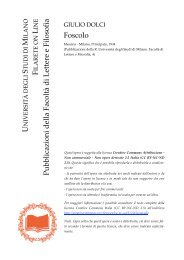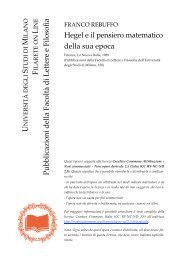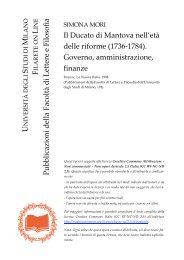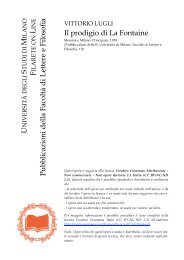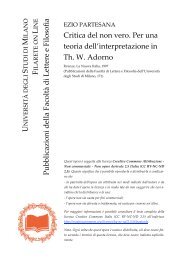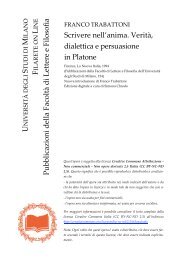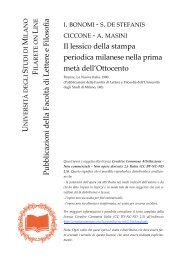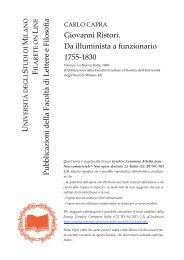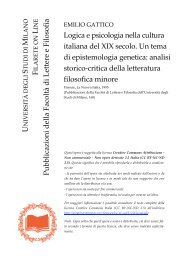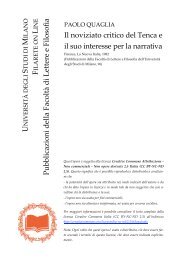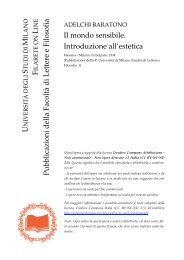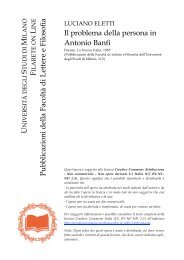Dialoghi sulla religione naturale - Studi umanistici Unimi - Università ...
Dialoghi sulla religione naturale - Studi umanistici Unimi - Università ...
Dialoghi sulla religione naturale - Studi umanistici Unimi - Università ...
You also want an ePaper? Increase the reach of your titles
YUMPU automatically turns print PDFs into web optimized ePapers that Google loves.
238 1L REFERENTE STORICO<br />
John Home volle mettere in scena la sua tragedia Douglas attirandosi<br />
contro tutto lo schieramento dei highflyers, sdegnati dal fatto che un<br />
reverendo si fosse dato al teatro. Qui il contrasto fra i due partiti eccle<br />
siastici diventa immediatamente un contrasto in materia di politica eco<br />
nomica. In un pamphlet satirico si attribuisce la seguente risoluzione<br />
al presbitery di Edimburgo, che aveva censurato John Home.<br />
Resolved, That Improvements of ali Sorts are hurtful to Society.<br />
Ordered, That no Alteration be ever attempted to be made of thè<br />
Principles, thè Customs, and thè Manners of Men.<br />
Ordered, That thè Method of improving Land by enclosing and<br />
fallowing be immediately laid aside because... it is offen<br />
sive to thè People.<br />
Ordered, That thè People of Scotland remain for ever in Barbarity 33 .<br />
Esplicita è la posizione presa da Adam Ferguson a proposito del<br />
Douglas, in The morality of stage plays seriously constdered (1757),<br />
in cui mette in chiaro che attentare ai diritti (compreso quello di an<br />
dare a teatro) dei ricchi significava attentare all'intero ordine sociale 34 .<br />
and, on thè contrary, whatever tended to obstruct them, would displease upon that<br />
account; so virtue, which is, as it were, thè fine polish to thè wheels of society,<br />
necessarily pleases; while vice, like thè vile rust, which makes them jar and grate<br />
upon one another, is as necessarily offensive » (ibidem); sia alla sua dottrina della<br />
« mano invisibile », presente non solo in The wealth of nations, ma anche nella<br />
Theory of moral sentiments, come causa dell'accordo non solo delle contrastanti<br />
« passioni economiche », ma di ogni tipo di passione (cfr. ivi, part IV, eh. I, pp.<br />
264-65). Sul parallelismo fra newtonianismo e dottrina di Smith, vedi R. R. BLACK,<br />
A comparison of classical English economie thought with Newtonian naturai philo-<br />
sophy (Ph. D. Dissertation, University of California, Berkeley 1963).<br />
33 Votes of thè P[resbiter];y of E[dinburg]&, s. 1. né data [Edinburgh 1757?],<br />
pp. 2-4<br />
34 Scrive Ferguson: « It has pleased Providence, for wise purpose, to piace<br />
inen in different stations, and to bestow upon them different degrees of wealth.<br />
Without this circumstance there could be no subordination, no government, no<br />
order, no industry. Every person does good, and promotes thè happiness of so<br />
ciety, by living agreeable to thè rank in which providence has placed him... whilst<br />
from humanity we indulge thè poor in their station, we ought from justice to<br />
indulge thè wealthy in theirs, and to expect that they are to go on agreeable to thè<br />
habits of living which belong to their station, and which in effect are necessary<br />
to thè order and good of society, and to thè maintenance of thè poor » (The mo<br />
rality of stage plays seriously considered, Edinburgh 1757, pp. 24-5; cfr. D. KET-<br />
TLER, The social and politicai thought of Adam Ferguson, Columbus [Ohio], pp.<br />
84-5).



